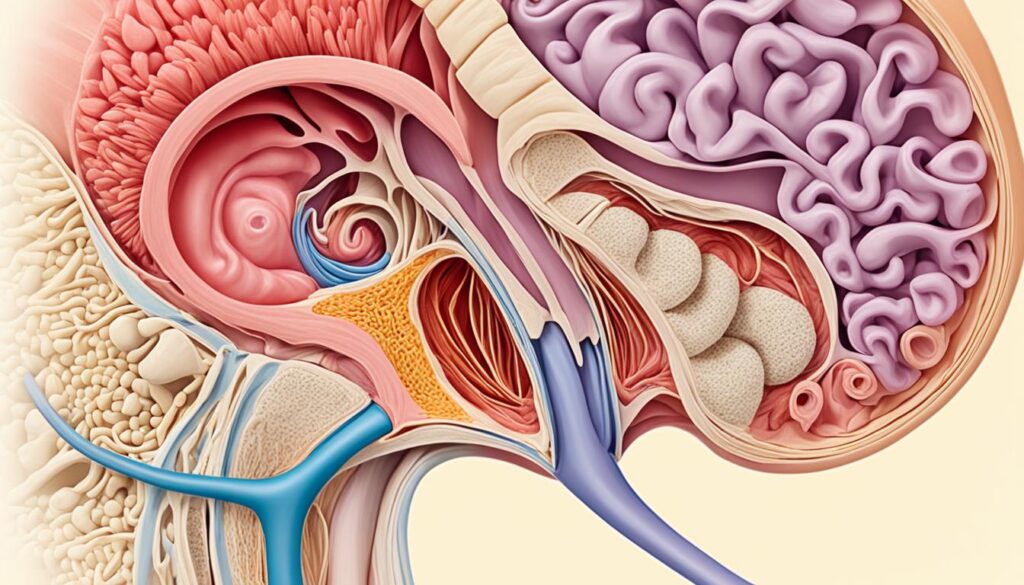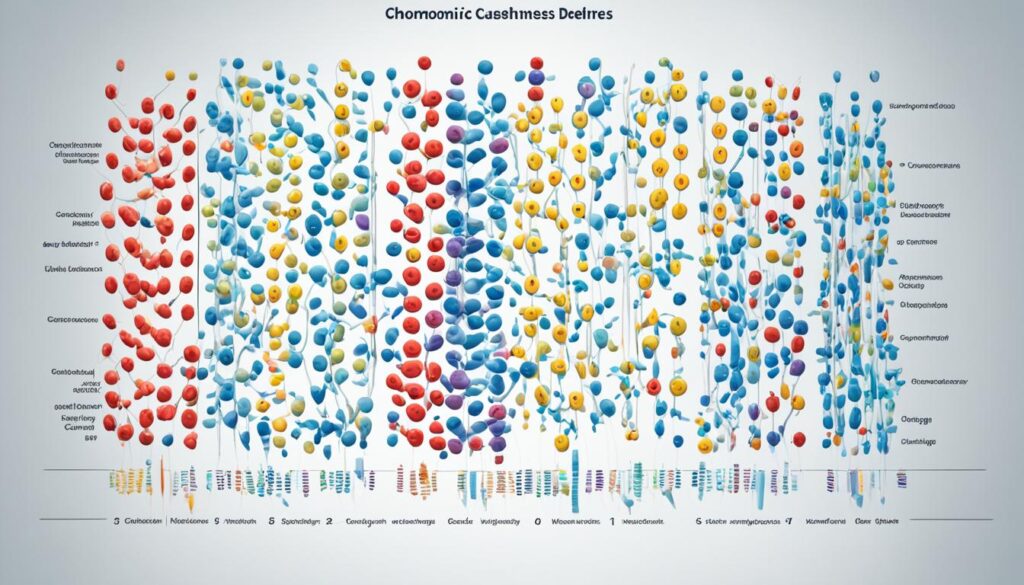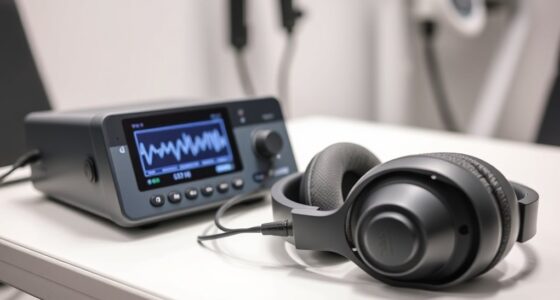Have you ever imagined navigating life in complete silence? To exist in an environment devoid of the joyful laughter, melodies, and the comforting sound of a familiar voice, where such experiences are merely a vague memory? Regrettably, for countless people who were born with congenital deafness, this silence is all they have known from the start.
Congenital deafness, also known as deafness from birth, is a condition that affects approximately 2-3 in every 1000 births. It can be caused by a variety of factors, including genetic hearing impairment, environmental influences, and viral infections during pregnancy. This type of deafness can range from mild to profound, impacting not only an individual’s ability to hear, but also their language development, social interactions, and overall quality of life.
At [Your Brand Name], we understand the challenges and complexities that come with congenital deafness. We believe that every individual deserves the opportunity to thrive, regardless of their hearing abilities. That’s why we are committed to providing you with the knowledge, resources, and support you need to navigate this journey and ensure the best possible outcomes for you and your loved ones.
Key Takeaways:
- Congenital deafness affects approximately 2-3 in every 1000 births.
- It can be caused by genetic factors, environmental influences, and viral infections during pregnancy.
- Congenital deafness can range from mild to profound, impacting an individual’s language development and overall quality of life.
- [Your Brand Name] is dedicated to providing support and resources for individuals with congenital deafness and their families.
- Early intervention and appropriate treatment options can greatly improve outcomes for individuals with congenital deafness.
Prevalence and Impact of Congenital Deafness
Congenital deafness is a prevalent condition, affecting an estimated 2-3 in every 1000 births in the United States. The prevalence of congenital deafness underscores the importance of understanding its impact on individuals and society as a whole. Moderate to profound hearing loss, characteristic of congenital deafness, can significantly impact a child’s speech and language acquisition, as well as their social and cognitive development.
For children with congenital deafness, language development can be particularly challenging. The ability to hear and differentiate sounds is crucial for learning how to speak and understand spoken language. Without proper intervention, congenital deafness can hinder a child’s ability to communicate effectively and engage in meaningful interactions.
Hearing aids and cochlear implants play a crucial role in mitigating the impact of congenital deafness. These assistive devices help individuals with congenital hearing loss access sound and improve their communication abilities. Hearing aids amplify sounds, making them clearer and more audible, while cochlear implants bypass damaged parts of the ear and stimulate the auditory nerve directly. Both options can greatly enhance a person’s quality of life by facilitating language development and communication skills.
Early detection and intervention are key factors in managing the impact of congenital deafness. Newborn hearing screening programs, conducted shortly after birth, have become standard practice in the United States. These screenings allow for the early identification of hearing loss, enabling immediate intervention and appropriate support for infants with congenital deafness.
| Prevalence of Congenital Deafness | Effects on Social and Cognitive Development | Treatment Options |
|---|---|---|
| Congenital deafness affects 2-3 in every 1000 births | Impairs speech and language acquisition | Hearing aids and cochlear implants provide assistive support |
| Can hinder social interactions | Early intervention improves language development | |
| Challenges cognitive development | Facilitates communication skills |
By addressing the prevalence of congenital deafness and understanding its impact, we can emphasize the importance of early detection, intervention, and access to appropriate treatment options. Supporting individuals with congenital deafness in their journey to better hearing and communication is essential for their overall well-being and integration into society.
Causes of Congenital Deafness
Congenital deafness, or deafness from birth, can be attributed to various factors, including both genetic and environmental causes. Genetic causes account for approximately 50% of cases, and they can be further classified as syndromic or non-syndromic. On the other hand, environmental causes, such as viral infections, can also contribute to the development of congenital deafness.
One of the most common viral infections associated with congenital deafness is cytomegalovirus (CMV) infection. CMV is a member of the herpesvirus family and can be transmitted from mother to fetus during pregnancy. Approximately 0.6-0.7% of newborns in industrialized countries are affected by congenital CMV infection, making it a significant cause of hearing loss in infants. Hearing loss related to congenital CMV infection can either be present at birth or develop within the first few years of life.
Another viral infection that can lead to congenital deafness is Rubella, commonly known as German measles. Rubella infection during pregnancy can increase the risk of hearing loss in the developing fetus. It is crucial for pregnant women to ensure they are immune to Rubella through vaccination or previous infection to prevent potential complications.
To illustrate the prevalence of congenital CMV infection, consider the following table:
| Country | Congenital CMV Infection Rate |
|---|---|
| United States | 0.6-0.7% |
| United Kingdom | 0.5-0.6% |
| Germany | 0.5-0.6% |
This table highlights the prevalence of congenital CMV infection in various countries, emphasizing the global impact of this non-genetic cause of congenital deafness.
Understanding the genetic and environmental causes of congenital deafness is essential for effective diagnosis and intervention. By identifying the underlying causes, healthcare professionals can tailor treatment plans and support strategies to best meet the needs of individuals with congenital deafness.

Diagnosis of Congenital Deafness
In the United States, more than 95% of children undergo universal neonatal hearing screening shortly after birth. This screening is a crucial step in identifying potential cases of congenital deafness. It helps healthcare professionals determine if further testing is necessary to assess the hearing capabilities of newborns.
If a child fails the initial hearing screening, a repeat test is typically performed to confirm the results. This repeat test allows for a more comprehensive evaluation of the child’s hearing abilities and helps determine the next steps in their care.
Auditory Brainstem Response (ABR)
In some cases, additional diagnostic testing, such as auditory brainstem response (ABR), may be recommended. ABR is a procedure that measures the brain’s response to sound. It involves placing electrodes on the child’s scalp and recording the electrical activity as the child is presented with sounds. This test provides valuable information about the child’s hearing abilities and the functioning of the auditory pathway.
Further Testing
In certain situations, additional tests may be required to determine the cause and extent of the child’s hearing loss. These tests can include CT scans, MRI scans, and other relevant diagnostic procedures. These imaging tests help healthcare professionals get a clear picture of the child’s auditory system and identify any structural abnormalities that may be affecting their hearing.
Early and accurate diagnosis of congenital deafness is essential for proper management and intervention. Diagnostic tests such as universal neonatal hearing screening, ABR, and imaging scans play a vital role in identifying the cause and extent of hearing loss, providing crucial information for developing a comprehensive treatment plan.

Treatment Options for Congenital Deafness
When it comes to managing congenital deafness, there are several treatment options available to support individuals with different levels of hearing loss. These options include hearing aids, cochlear implants, speech therapy, and comprehensive cochlear implant programs.
Hearing Aids
Hearing aids are commonly used to assist individuals with mild to moderate hearing loss. These small electronic devices are designed to amplify sounds, making them louder and clearer for the wearer. They can be worn comfortably behind or inside the ear and come in a variety of styles to suit personal preferences.

Cochlear Implants
For individuals with severe to profound hearing loss, cochlear implants can provide a sense of sound. These devices consist of an external component worn behind the ear and an internal component surgically implanted in the inner ear. Cochlear implants work by directly stimulating the auditory nerve, bypassing the damaged parts of the ear, and sending sound signals to the brain.
Comprehensive Cochlear Implant Programs
Comprehensive cochlear implant programs offer specialized care for children with congenital or early onset deafness. These programs, such as the one provided by Penn State Health Children’s Hospital, provide a holistic approach to cochlear implantation, including thorough evaluations, surgical procedures, and post-implantation support. They aim to optimize the outcomes and quality of life for children who receive cochlear implants.
Speech Therapy
Speech therapy plays a crucial role in the overall treatment of congenital deafness. It focuses on developing communication skills and supporting language development. Speech therapists work closely with individuals with hearing loss to improve speech clarity, enhance language comprehension, and promote effective communication strategies.
| Treatment Option | Target Audience | Description |
|---|---|---|
| Hearing Aids | Individuals with mild to moderate hearing loss | Amplify sounds to improve hearing and clarity |
| Cochlear Implants | Individuals with severe to profound hearing loss | Provide a sense of sound by stimulating the auditory nerve |
| Comprehensive Cochlear Implant Programs | Children with congenital or early onset deafness | Specialized care and support throughout the cochlear implantation process |
| Speech Therapy | Individuals with hearing loss | Helps improve speech clarity, language comprehension, and communication skills |
In conclusion, treatment options for congenital deafness, such as hearing aids, cochlear implants, speech therapy, and comprehensive cochlear implant programs, aim to improve hearing, enhance communication, and support overall quality of life for individuals with congenital deafness.
Research and Advances in Congenital Deafness
As we continue to delve into the field of congenital deafness, our focus turns towards groundbreaking research and the development of innovative treatment options. Our aim is to enhance the lives of individuals with congenital deafness by exploring new frontiers in the field.
Gene therapy emerges as a promising area of study, offering potential treatments for genetic causes of congenital deafness. By targeting specific genes responsible for hearing loss, gene therapy holds the key to restoring auditory function in individuals affected by genetic mutations. This groundbreaking approach opens doors to a future where congenital deafness could be treated at its core, bringing hope to individuals and their families.
Animal models play a crucial role in advancing our understanding of congenital deafness. Guinea pigs and mice serve as valuable resources in comprehending the underlying mechanisms of hearing loss and evaluating potential treatments. Through these animal models, researchers are investigating promising therapies, conducting experiments, and paving the way for future advancements in the field.
We must remember that every advancement we make, no matter how small, is a step towards a brighter future for individuals with congenital deafness.
Viral infections, such as cytomegalovirus (CMV), pose a significant risk to hearing in newborns. Researchers are tirelessly working towards the development of a CMV vaccine to prevent congenital CMV infection and subsequent hearing loss. By targeting the prevention of viral infections, we hope to eliminate one of the leading causes of congenital deafness, bolstering the health and well-being of countless children.
Our commitment to research and innovation drives us forward in the pursuit of improved treatments and a future without congenital deafness. Through gene therapy, animal models, and vaccine development, we are inching closer to a world where the limitations imposed by hearing loss at birth are overcome.

| Treatment Development | Advancements |
|---|---|
| Gene Therapy | Targeting genetic causes |
| Animal Models | Understanding mechanisms and testing treatments |
| Viral Infections | CMV vaccine development to prevent hearing loss |
Support and Resources for Individuals with Congenital Deafness
At the heart of our mission is providing comprehensive support and resources for individuals with congenital deafness and their families. We understand that a diagnosis of congenital deafness can be challenging, but you don’t have to face it alone. We offer a variety of support groups where you can connect with others who share similar experiences, share advice, and find reassurance. These support groups create a sense of community and belonging, fostering a supportive environment for everyone.

In addition to support groups, speech therapy plays a crucial role in language development and communication skills for individuals with hearing loss. Our highly trained and experienced speech therapists work closely with individuals of all ages to develop effective strategies for improving speech and language abilities. Through personalized therapy sessions, we assist individuals with congenital deafness in enhancing their communication skills, building confidence, and achieving their full potential.
When it comes to managing and treating congenital deafness, we recognize the importance of specialized care. That’s why we have a team of skilled developmental pediatricians and genetic specialists who provide comprehensive medical evaluation and guidance. Our experts have extensive knowledge and experience in working with individuals with congenital deafness, ensuring that they receive the care and support tailored to their unique needs.
Supporting individuals with congenital deafness requires a multifaceted approach, addressing not only their medical needs but also their social and emotional well-being. That’s why we strive to provide access to a range of resources, including educational materials, counseling services, and sign language classes. Our goal is to equip individuals and their families with the tools and knowledge they need to thrive, fostering independence and a sense of empowerment.
We understand that no two individuals with congenital deafness are the same. Each person’s journey is unique, and what works for one may not work for another. That’s why our support and resources are designed to be flexible, personalized, and adaptable to meet the diverse needs of the congenital deaf community.
To learn more about our support groups, speech therapy services, developmental pediatrics, and genetic specialists, reach out to our team today. We are committed to providing the support and resources necessary for individuals with congenital deafness to lead fulfilling lives.
The Importance of Early Detection and Intervention
Early detection and intervention play a crucial role in supporting individuals with congenital deafness. The timely identification of hearing loss is vital for ensuring proper language and cognitive development. When hearing loss is identified early, appropriate interventions can be implemented to optimize the individual’s communication skills and overall quality of life.
One of the key methods for early detection of hearing loss in newborns is through universal neonatal hearing screening programs. These programs aim to identify any hearing impairments shortly after birth, allowing healthcare professionals to provide immediate support and intervention. By identifying hearing loss early on, healthcare providers can work with families to develop a comprehensive plan to address the specific needs of the child.
Children with congenital deafness who receive early and appropriate intervention experience better outcomes in terms of language development. Language skills are crucial for effective communication, social interactions, and academic success. Early intervention programs, such as speech therapy, can help children with congenital deafness develop essential language skills and bridge communication gaps.
Furthermore, cognitive development is closely tied to language development. Early intervention can positively impact cognitive abilities by providing the necessary support for language acquisition and comprehension. Children who receive early intervention services demonstrate improved cognitive skills and have a better foundation for academic success.
By identifying hearing loss early and providing timely interventions, individuals with congenital deafness can develop strong communication skills. Effective communication is crucial for connecting with others, expressing oneself, and building relationships. Early intervention programs focus on enhancing communication skills, including the use of assistive devices like hearing aids or cochlear implants, to ensure that individuals with congenital deafness can actively participate in conversations and engage in social interactions.
In conclusion, early detection and intervention are essential for individuals with congenital deafness. By identifying and addressing hearing loss at an early stage, we can support language development, cognitive development, and communication skills. With the appropriate interventions and support, individuals with congenital deafness can thrive and lead fulfilling lives.

Syndromic Causes of Congenital Deafness
When it comes to congenital deafness, there are cases where associated symptoms and genetic disorders are present, resulting in what is known as syndromic deafness. These syndromes can have various genetic causes, including gene mutations. Understanding these syndromic causes is crucial for comprehensive medical evaluation and management.
Syndromic deafness requires a thorough examination of the specific symptoms and conditions associated with the syndrome. By addressing these specific needs, healthcare professionals can provide tailored treatment and support to individuals with syndromic deafness.
Genetic testing and counseling play a vital role in diagnosing and managing syndromic causes of congenital deafness. Identifying the underlying genetic factors involved can provide valuable insights into the condition and help guide appropriate treatment decisions.

Associated Symptoms
Depending on the specific syndrome, individuals with syndromic deafness may experience a range of associated symptoms. These symptoms can vary widely and may include:
- Facial abnormalities
- Cardiac abnormalities
- Developmental delays
- Intellectual disabilities
- Vision problems
- Skeletal abnormalities
It is important to note that the presence of these associated symptoms can vary from one individual to another, even within the same syndrome. This highlights the importance of personalized medical evaluations and tailored treatment plans.
Genetic Disorders and Gene Mutations
Genetic disorders and gene mutations are common factors underlying syndromic causes of congenital deafness. These genetic abnormalities can disrupt the normal development and function of the auditory system, leading to hearing loss.
Several genetic disorders are known to be associated with syndromic deafness. Some examples include:
“Waardenburg syndrome: A genetic disorder characterized by hearing loss and pigmentary abnormalities, such as changes in hair, skin, and eye color.”
“Usher syndrome: A genetic disorder that causes hearing loss and visual impairment.”
Gene mutations can also play a significant role in syndromic deafness. Mutations in specific genes can disrupt the production of proteins necessary for the development and function of the auditory system. Identifying these gene mutations through genetic testing can help in diagnosing syndromic causes of congenital deafness.
| Genetic Disorder | Associated Symptoms |
|---|---|
| Waardenburg syndrome | Hearing loss, changes in hair, skin, and eye color |
| Usher syndrome | Hearing loss, visual impairment |
| Pendred syndrome | Hearing loss, goiter (enlarged thyroid gland) |
Table: Examples of Genetic Disorders Associated with Syndromic Deafness
Further Research and Future Directions
Research in the field of congenital deafness is ongoing, with a focus on developing new treatment options and advancing our understanding of the underlying causes. We are committed to pushing the boundaries of scientific knowledge and discovering innovative solutions to improve the lives of individuals with congenital deafness. Through continued research and collaboration, we aim to make significant strides in the following areas:
1. Clinical Trials
Clinical trials play a crucial role in testing new therapies and treatment approaches for congenital deafness. These trials allow us to evaluate the effectiveness and safety of potential interventions, bringing us one step closer to finding improved treatment options. By participating in clinical trials, individuals with congenital deafness have the opportunity to contribute to the advancement of medical knowledge and shape the future of treatment for this condition.
2. Treatment Advancements
Advancements in treatment options are constantly being explored to address the specific needs of individuals with congenital deafness. Our research focuses on developing cutting-edge technologies and interventions that can restore or enhance hearing abilities. From innovative hearing aids to revolutionary surgical techniques, we strive to provide individuals with congenital deafness access to the most advanced and effective treatment options available.
3. Gene Therapy
Gene therapy holds tremendous promise for the treatment of congenital deafness caused by genetic mutations. Through targeted gene therapies, we aim to correct or replace defective genes, restoring normal hearing function. By leveraging the latest advancements in gene therapy techniques and strategies, we hope to offer individuals with genetic forms of congenital deafness a potential cure for their condition. Our research in gene therapy is guided by the goal of bringing personalized and precise treatments to those who need it most.
4. Vaccine Development
Viral infections, such as cytomegalovirus (CMV) and Rubella, can contribute to congenital deafness. As part of our research efforts, we are actively involved in the development of vaccines to prevent these viral infections during pregnancy. By preventing viral infections associated with congenital deafness, we can significantly reduce the incidence of this condition and its impact on individuals and their families.
| Treatment Advancements | Benefits |
|---|---|
| Hearing Aids | Amplify sound for individuals with mild to moderate hearing loss |
| Cochlear Implants | Surgically implanted devices that provide a sense of sound for individuals with severe to profound hearing loss |
| Gene Therapy | Potential to correct or replace defective genes causing congenital deafness |
| Vaccine Development | Prevent viral infections associated with congenital deafness |
Conclusion
Congenital deafness, a common birth defect, can have a significant impact on an individual’s life. Early detection and intervention are crucial for managing this condition and supporting language development, communication skills, and overall quality of life. Treatment options such as hearing aids and cochlear implants play a vital role in providing a sense of sound and improving communication abilities.
Through ongoing research and advancements in the field, we are continuously striving to improve treatment options and outcomes for individuals with congenital deafness. Gene therapy and vaccine development for viral infections hold promise for further advancements in managing this condition. It is important to prioritize early intervention and provide comprehensive support to individuals with congenital deafness to help them thrive.
With a commitment to early intervention, appropriate treatment options, and ongoing research, we can make a positive impact on the lives of individuals with congenital deafness. By fostering language development and communication skills, we empower them to reach their full potential and lead fulfilling lives.
FAQ
What is congenital deafness?
Congenital deafness is a type of hearing loss that is present at birth or acquired shortly after, affecting individuals from infancy. It can range from mild to profound and can be caused by genetic or environmental factors.
How common is congenital deafness?
Congenital deafness affects approximately 2-3 in every 1000 births in the United States.
What are the causes of congenital deafness?
Congenital deafness can be caused by genetic factors, such as gene mutations, or environmental factors, including viral infections like cytomegalovirus (CMV) and Rubella.
How is congenital deafness diagnosed?
Congenital deafness is often detected through universal neonatal hearing screening programs. Further diagnostic testing may include auditory brainstem response (ABR), CT scan, and MRI scan to determine the cause and extent of the hearing loss.
What are the treatment options for congenital deafness?
Treatment options for congenital deafness include hearing aids, which amplify sound for individuals with mild to moderate hearing loss, and cochlear implants, surgically implanted devices that provide a sense of sound for individuals with severe to profound hearing loss.
Is there ongoing research for congenital deafness?
Yes, research is ongoing, focusing on developing new therapies and treatment options. Gene therapy and vaccine development for viral infections are among the areas of research in the field.
Where can individuals with congenital deafness find support and resources?
There are support groups, speech therapy services, and specialists in developmental pediatrics and genetics who can provide guidance and support for individuals with congenital deafness.
How important is early detection and intervention for congenital deafness?
Early detection and intervention are crucial for individuals with congenital deafness as they greatly impact language development, cognitive development, and communication skills.
Are there syndromic causes of congenital deafness?
Yes, syndromic deafness is associated with other symptoms and genetic disorders, which may require comprehensive medical evaluation and management.
What does the future hold for congenital deafness research?
Ongoing research and advancements in the field hold promise for improving treatment options and outcomes, including gene therapy and further development of vaccines for viral infections.











